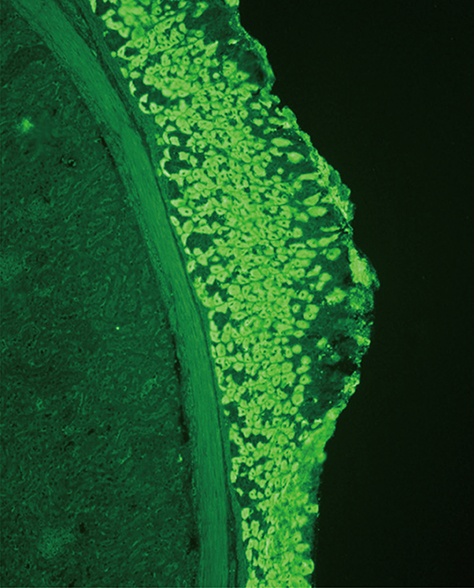Lab Med Online.
2014 Jul;4(3):172-175. 10.3343/lmo.2014.4.3.172.
A Case of Thyrotoxicosis with the Presence of Anti-Gastric Parietal Cell Antibodies
- Affiliations
-
- 1Department of Laboratory Medicine, Hanyang University School of Medicine, Seoul, Korea. tykim@hanyang.ac.kr
- KMID: 1706856
- DOI: http://doi.org/10.3343/lmo.2014.4.3.172
Abstract
- The presence of anti-gastric parietal cell antibodies (AGPAs) has been strongly associated with the pathogenesis of pernicious anemia and atrophic gastritis and has been rarely reported in thyrotoxicosis. In addition, AGPAs more commonly occur in the Western population. No case of AGPA occurring in thyrotoxicosis has been reported in Korea to date. We report a case involving the occurrence of AGPAs in a thyrotoxicosis patient examined at the Hanyang University Hospital. Upon medical consultation, a 55-yr-old woman with no significant medical history was found to have elevated levels of cholesterol, AST, ALT, gamma glutamyl transferase, and mild anemia. Further blood tests revealed elevated levels of T3, free T4, and thyroid-stimulating immunoglobulin (TSI), low level of thyroid-stimulating hormone (TSH), and negative results for the anti-thyroid peroxidase antibody (anti-TPO) and anti-thyroglobulin antibody (anti-TG), for which the patient was diagnosed with thyrotoxicosis. To rule out autoimmune hepatitis in the explanation of the continuously elevated levels of AST and ALT, the autoimmune target (AIT), anti-smooth muscle antibody (ASMA), anti-liver/kidney/microsomal antibody (LKM), anti-mitochondria antibody (AMA) and anti-neutrophil cytoplasmic antibody (ANCA) tests were done, and the results were all negative. However, during this process, the patient tested positive for AGPA, when stomach tissue was used as the sample. Finally, the patient was diagnosed with thyrotoxicosis without any other autoimmune disease. This is the first report of confirmed presence of AGPA in a thyrotoxicosis-only patient in Korea.
MeSH Terms
-
Anemia
Anemia, Pernicious
Antibodies*
Antibodies, Antineutrophil Cytoplasmic
Autoimmune Diseases
Cholesterol
Female
Gastritis, Atrophic
Hematologic Tests
Hepatitis, Autoimmune
Humans
Immunoglobulins, Thyroid-Stimulating
Korea
Peroxidase
Rabeprazole*
Stomach
Thyrotoxicosis*
Thyrotropin
Transferases
Antibodies
Antibodies, Antineutrophil Cytoplasmic
Cholesterol
Immunoglobulins, Thyroid-Stimulating
Peroxidase
Thyrotropin
Transferases
Figure
Reference
-
1. Taylor KB, Roitt IM, Doniach D, Couchman KG, Shapland C. Autoimmune phenomena in pernicious anaemia: gastric antibodies. Br Med J. 1962; 2:1347–1352.
Article2. Sugiu K, Kamada T, Ito M, Kaya S, Tanaka A, Kusunoki H, et al. Evaluation of an ELISA for detection of anti-parietal cell antibody. Hepatogastroenterology. 2006; 53:11–14.3. Doniach D, Roitt IM, Taylor KB. Autoimmunity in pernicious anemia and thyroiditis: a family study. Ann N Y Acad Sci. 1965; 124:605–625.
Article4. Irvine WJ. Immunologic aspects of pernicious anemia. N Engl J Med. 1965; 273:432–438.
Article5. Cruchaud A, Juditz E. An analysis of gastric parietal cell antibodies and thyroid cell antibodies in patients with pernicious anaemia and thyroid disorders. Clin Exp Immunol. 1968; 3:771–781.6. Irvine WJ. The significance of gastric antibodies. Clinical and pathological signifance of parietal cell antibodies. Proc R Soc Med. 1966; 59:695–698.7. Irvine WJ, Davies SH, Teitelbaum S, Delamore IW, Williams AW. The clinical and pathological significance of gastric parietal cell antibody. Ann N Y Acad Sci. 1965; 124:657–691.
Article8. Sun A, Wang YP, Lin HP, Chia JS, Chiang CP. Do all the patients with gastric parietal cell antibodies have pernicious anemia? Oral Dis. 2013; 19:381–386.
Article9. Irvine WJ, Davies SH, Delamore IW, Williams AW. Immunological relationship between pernicious anaemia and thyroid disease. Br Med J. 1962; 2:454–456.
Article10. Tozzoli R, Kodermaz G, Perosa AR, Tampoia M, Zucano A, Antico A, et al. Autoantibodies to parietal cells as predictors of atrophic body gastritis: a five-year prospective study in patients with autoimmune thyroid diseases. Autoimmun Rev. 2010; 10:80–83.
Article11. Irvine WJ. Gastric antibodies studied by fluorescence microscopy. Q J Exp Physiol Cogn Med Sci. 1963; 48:427–438.
Article12. Irvine WJ. The association of atrophic gastritis with autoimmune thyroid disease. Clin Endocrinol Metab. 1975; 4:351–377.
Article13. Uibo R, Krohn K, Villako K, Tammur R, Tamm A. Relation of parietal cell and thyroid antibodies to the state of gastric mucosa and basal serum gastrin levels during a 6-year follow up. Clin Exp Immunol. 1989; 77:202–205.14. Checchi S, Montanaro A, Pasqui L, Ciuoli C, De Palo V, Chiappetta MC, et al. L-thyroxine requirement in patients with autoimmune hypothyroidism and parietal cell antibodies. J Clin Endocrinol Metab. 2008; 93:465–469.
Article
- Full Text Links
- Actions
-
Cited
- CITED
-
- Close
- Share
- Similar articles
-
- Expression of AQP-4 in Developing Rat Stomach: An Immunohistochemical Study
- A case of thyrotoxicosis after sunitinib treatment
- Radioactive Iodine-Induced Graves' Disease in a Patient with Toxic Adenoma
- alphabeta T - Helper Cell Dependency in the Development of Anticardiolipin and Anti - beta2 Glycoprotein I Antibodies in MRL / MP - lpr / lpr Mice
- Five Autoimmune Gastritis Patients with Positive Findings of Serum Anti-parietal Cell Antibodies


